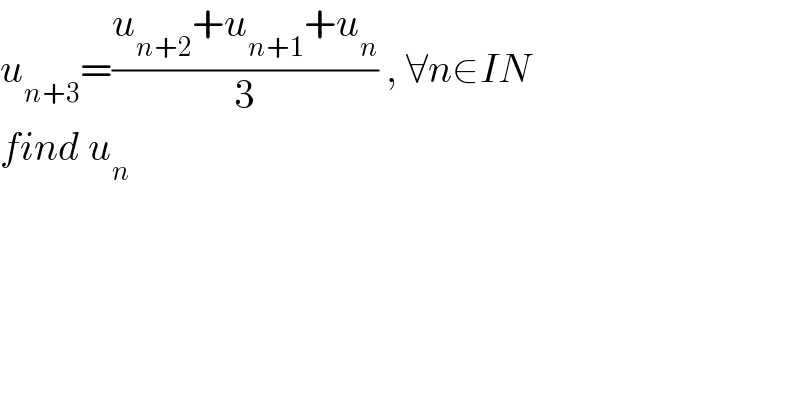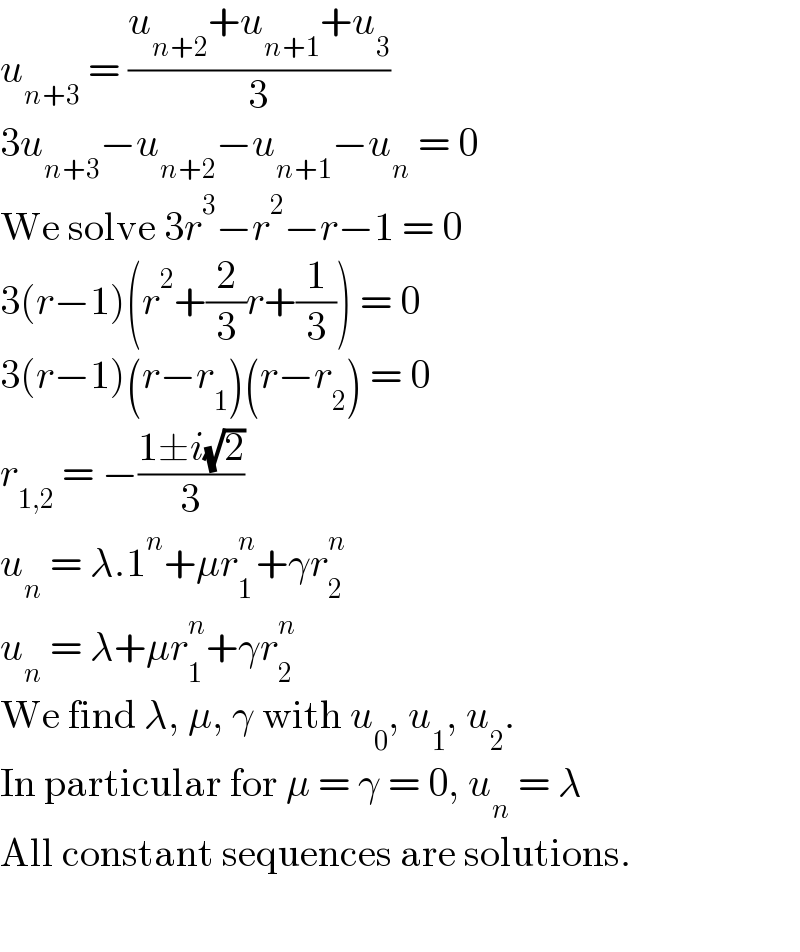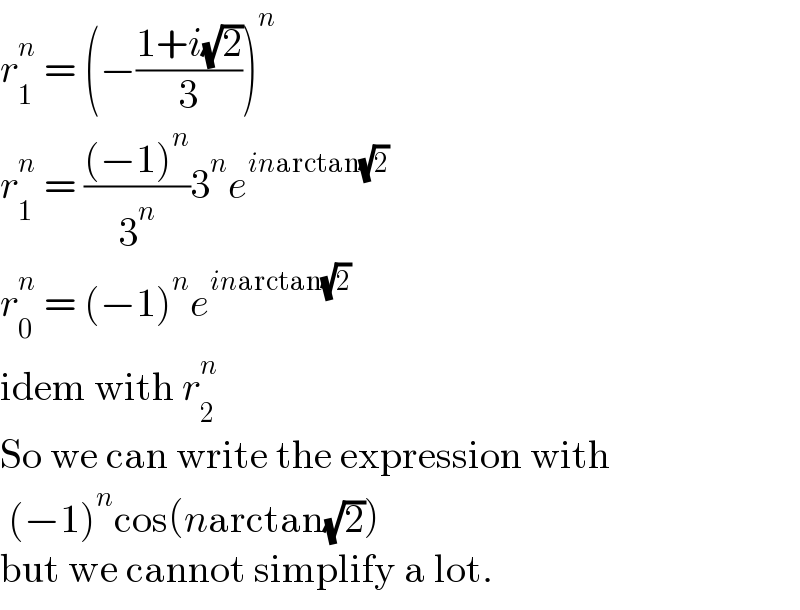
Question Number 148645 by metamorfose last updated on 29/Jul/21

$${u}_{{n}+\mathrm{3}} =\frac{{u}_{{n}+\mathrm{2}} +{u}_{{n}+\mathrm{1}} +{u}_{{n}} }{\mathrm{3}}\:,\:\forall{n}\in{IN} \\ $$$${find}\:{u}_{{n}} \: \\ $$
Answered by Olaf_Thorendsen last updated on 29/Jul/21

$${u}_{{n}+\mathrm{3}} \:=\:\frac{{u}_{{n}+\mathrm{2}} +{u}_{{n}+\mathrm{1}} +{u}_{\mathrm{3}} }{\mathrm{3}} \\ $$$$\mathrm{3}{u}_{{n}+\mathrm{3}} −{u}_{{n}+\mathrm{2}} −{u}_{{n}+\mathrm{1}} −{u}_{{n}} \:=\:\mathrm{0} \\ $$$$\mathrm{We}\:\mathrm{solve}\:\mathrm{3}{r}^{\mathrm{3}} −{r}^{\mathrm{2}} −{r}−\mathrm{1}\:=\:\mathrm{0} \\ $$$$\mathrm{3}\left({r}−\mathrm{1}\right)\left({r}^{\mathrm{2}} +\frac{\mathrm{2}}{\mathrm{3}}{r}+\frac{\mathrm{1}}{\mathrm{3}}\right)\:=\:\mathrm{0} \\ $$$$\mathrm{3}\left({r}−\mathrm{1}\right)\left({r}−{r}_{\mathrm{1}} \right)\left({r}−{r}_{\mathrm{2}} \right)\:=\:\mathrm{0} \\ $$$${r}_{\mathrm{1},\mathrm{2}} \:=\:−\frac{\mathrm{1}\pm{i}\sqrt{\mathrm{2}}}{\mathrm{3}} \\ $$$${u}_{{n}} \:=\:\lambda.\mathrm{1}^{{n}} +\mu{r}_{\mathrm{1}} ^{{n}} +\gamma{r}_{\mathrm{2}} ^{{n}} \\ $$$${u}_{{n}} \:=\:\lambda+\mu{r}_{\mathrm{1}} ^{{n}} +\gamma{r}_{\mathrm{2}} ^{{n}} \\ $$$$\mathrm{We}\:\mathrm{find}\:\lambda,\:\mu,\:\gamma\:\mathrm{with}\:{u}_{\mathrm{0}} ,\:{u}_{\mathrm{1}} ,\:{u}_{\mathrm{2}} . \\ $$$$\mathrm{In}\:\mathrm{particular}\:\mathrm{for}\:\mu\:=\:\gamma\:=\:\mathrm{0},\:{u}_{{n}} \:=\:\lambda \\ $$$$\mathrm{All}\:\mathrm{constant}\:\mathrm{sequences}\:\mathrm{are}\:\mathrm{solutions}. \\ $$$$ \\ $$
Commented by Olaf_Thorendsen last updated on 29/Jul/21

$${r}_{\mathrm{1}} ^{{n}} \:=\:\left(−\frac{\mathrm{1}+{i}\sqrt{\mathrm{2}}}{\mathrm{3}}\right)^{{n}} \\ $$$${r}_{\mathrm{1}} ^{{n}} \:=\:\frac{\left(−\mathrm{1}\right)^{{n}} }{\mathrm{3}^{{n}} }\mathrm{3}^{{n}} {e}^{{in}\mathrm{arctan}\sqrt{\mathrm{2}}} \\ $$$${r}_{\mathrm{0}} ^{{n}} \:=\:\left(−\mathrm{1}\right)^{{n}} {e}^{{in}\mathrm{arctan}\sqrt{\mathrm{2}}} \\ $$$$\mathrm{idem}\:\mathrm{with}\:{r}_{\mathrm{2}} ^{{n}} \\ $$$$\mathrm{So}\:\mathrm{we}\:\mathrm{can}\:\mathrm{write}\:\mathrm{the}\:\mathrm{expression}\:\mathrm{with} \\ $$$$\:\left(−\mathrm{1}\right)^{{n}} \mathrm{cos}\left({n}\mathrm{arctan}\sqrt{\mathrm{2}}\right) \\ $$$$\mathrm{but}\:\mathrm{we}\:\mathrm{cannot}\:\mathrm{simplify}\:\mathrm{a}\:\mathrm{lot}. \\ $$
Commented by metamorfose last updated on 29/Jul/21

$${thank}\:{u}\:{sir}. \\ $$
Commented by metamorfose last updated on 29/Jul/21

$${i}\:{thought}\:{the}\:{expression}\:{would}\:{be}\:{with}\:{cos} \\ $$
